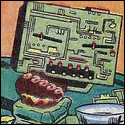|
Quantum of Phallus posted:They really need another tier below unsupported for games like Destiny 2 that absolutely wonít run. "hosed"
|
|
|
|

|
| # ? May 25, 2024 18:20 |
|
Heran Bago posted:Running out of steam on Dark Cloud 2 in the ocean area. Since discovering I can run NGU Idle and level FFXIV crafters at the same time that's what's been happening. NGU has a decent official layout even. All without turning into a jet engine. What a nice little machine. i've wondered if you can do this. so cool! i linked your thread in the games index thread
|
|
|
|
ugh i just found out about how the steamdeck locks down the root file system. I'm wanting to install some libraries for programs, but my only recourse is homebrew which seem to be a bit intricate. Cmake seems to not be able to find some of the standard c++ libraries, for instance
|
|
|
|
|
To enable writes: sudo steamos-readonly disable To enable installing arch packages: sudo pacman-key --init sudo pacman-key --populate archlinux Try searching for the packages you want in Arch contrib and extra, and then in AUR. Most things are in one of those and Arch packages are usually very well curated. Use yay instead of pacman to search both sources at the same time: yay -S packagename
|
|
|
|
Kin posted:Was thinking about ordering a Steam Deck but some folks in the Steam thread mentioned games not automatically working. 1. Games that work perfectly, out-of-the-box, and require no tinkering for reasonable controls and decent battery life. Examples: Final Fantasy I-IV Pixel Remasters. 2. Games that work almost perfectly, out-of-the-box, but you might still need to do something like enable the 30 FPS frame limiter in the Performance overlay. Example: Spider-Man Remastered--It's verified, has default controls and graphic options tuned for the Deck, but you still need to manually enable the frame limiter to improve battery life and get good frame pacing. Hardly a big deal, but it's something you need to know about. 3. Games that work acceptably, out-of-the-box, but benefit from tinkering with controls, graphics settings (both in-game and Performance overlay). Example: Outer Wilds, most FPSes that default to a "Gamepad with Joystick Trackpad" template that would better benefit from using the mouse-style trackpad, etc. This category still includes verified and "Great on Deck" games. 4. Games marked "Playable" that might require you to manually pop-up the on-screen keyboard for text entry by pressing Steam+X. These games won't be verified until they're updated to fix this, but othewise might be totally fine otherwise. Aside from keyboard input, they might fall into categories #1-3 otherwise. Example: Final Fantasy V would be #1 if it didn't require you to press Steam+X to name Butz, Butz. 5. Games marked "Unsupported" that might actually work fine if you look at protondb and do something like force running under Proton. Example: Dusk, prior to last week, would run the Linux-native version by default which had broken gamepad controls (triggers didn't work, d-pad wrong orientation). You could still get the game to work by switching to a Keyboard+Mouse template, or running under Proton (which is what I did). Dusk has since been updated, verified, and is a #1 game now. As a bonus, the saves kept and worked fine even after I switched backed to the Linux version. 6. Games marked "Unsupported" that you can still get to work with some investment. Example: Darkstalkers--to run you have to run it under an older version of Proton and then swap out one of the DLLs to get cutscenes to work correctly. Or Blood Fresh Supply which needs an updated SDL2.dll. I've yet to run into a game that straight up, didn't work. I'd say most games I've tried have been in #3-4 categories. Also, if you're not too concerned about getting a specific game to work, just having good games to play, there's plenty of titles that don't require (much) tinkering. But hopefully the above helps you figure out what to expect. ExcessBLarg! fucked around with this message at 15:10 on Sep 7, 2022 |
|
|
|
don't forget the games that absolutely will not work on SteamOS due to anti-cheat, Destiny 2 being the biggie
|
|
|
|
Watermelon Daiquiri posted:ugh i just found out about how the steamdeck locks down the root file system. I'm wanting to install some libraries for programs, but my only recourse is homebrew which seem to be a bit intricate. Cmake seems to not be able to find some of the standard c++ libraries, for instance
|
|
|
|
With stuff that needs tinkering, there's https://www.protondb.com which is a kind of community-collab of recommended tweaks and settings for stuff that isn't running smoothly out of the box as well, so even if you don't necessarily understand how to troubleshoot it yourself there's probably some quick steps to follow for most non-shovelware stuff.
|
|
|
ExcessBLarg! posted:You can make the file-system read-write but it breaks the update mechanism. The Deck is designed around using Flatpaks for third-party software installs and accommodates those much better. If you're able to build a Flatpak of whatever you're building it's going to be much smoother sailing. yeah homebrew is similar, but i'm worried about libraries and dependencies. Im new enough that i dont quite know yet how to include all the dependencies in a package so I dont have to worry about my main machine being ahead of the steamdeck when it comes to releases
|
|
|
|
|
ExcessBLarg! posted:You can make the file-system read-write but it breaks the update mechanism. I don't see anything about it breaking the update mechanism, do you have more detail? Valve's own FAQ says it's fine as long as you know what you're doing: quote:What if I want to do more than whatís available by flatpak? Arch's strength is in its well curated and vast array of packages. Restricting yourself to flatpaks - clean and neat as they are - is missing out on a large library of well packaged and well managed code.
|
|
|
|
v1ld posted:I don't see anything about it breaking the update mechanism, do you have more detail? Edit: Reading again, it looks like OS updates may replace the partition contents entirely, so instead of breaking updates it just wipes whatever changes you make. Which isn't ideal if you're not expecting it, but not the worst. v1ld posted:Arch's strength is in its well curated and vast array of packages. Restricting yourself to flatpaks - clean and neat as they are - is missing out on a large library of well packaged and well managed code. ExcessBLarg! fucked around with this message at 15:46 on Sep 7, 2022 |
|
|
|
ExcessBLarg! posted:It's an inherent thing. Deck OS updates assume the filesystem is in a particular state and if you make it read-write and start applying package updates and installs outside of what a Steam OS update expects, then the update may fail. You can always reinstall from the recovery image, but that's why the filesystem is read-only in the first place. It's worth remembering that installing packages is what SteamOS and the underlying Arch are designed for. This is what we do on every distro and Linux machine. So while it's entirely possible that installing a package can break things, it's also very unlikely if you know what you're doing - the distribution is designed to let you install and manage packages. Valve's FAQ addresses this directly and even points you at the way to make the filesystem read-write. It's a mistake to treat the Deck like the Switch or other hands-off device. You can and should do a lot more. So yes, user beware and do the right things but it's not accurate to say that installing packages will break the update mechanism - it's also unnecessarily scary. As the FAQ says, they may overwrite your changes in a future update - that's fine, the beauty of managed packages is that it's very simple to reinstall. Also worth pointing out that flatpaks - and containers in general - while brilliant at packaging dependencies and isolating the runtime into its own container also come with overhead in both complexity and runtime. Whether those will matter on a device like the Deck will come down to what you're doing. The protontricks flatpak for example had problems with access rights that I could have undoubtedly solved myself - but I didn't see the value in debugging what was ultimately a problem with the flatpak packaging and not protontricks itself. yay -S protontricks and I could get on with what I was interested in doing in the first place: modding Skyrim. Use flatpaks wherever possible - totally agreed - but don't rule out using all the additional power available because Valve chose to build SteamOS on Arch.
|
|
|
|
Does SteamOS let you hold off on an OS update? So that you can update / break things when you're prepared to have the time? Also, I assume you can set up a persistent config folder like you would with Docker?
|
|
|
|
should i update the emudeck emulators flatpaks when they come up with update needed in discover. i ran the installer again to see if those would pull the most recent versions but seemingly not
|
|
|
|
deong posted:Does SteamOS let you hold off on an OS update? Iíve never been forced to do an update yet. Iím not sure they will ever force updates.
|
|
|
|
v1ld posted:It's worth remembering that installing packages is what SteamOS and the underlying Arch are designed for. This is what we do on every distro and Linux machine. So while it's entirely possible that installing a package can break things, it's also very unlikely if you know what you're doing - the distribution is designed to let you install and manage packages. Valve's FAQ addresses this directly and even points you at the way to make the filesystem read-write. v1ld posted:It's a mistake to treat the Deck like the Switch or other hands-off device. You can and should do a lot more. None of this is irreparable, but telling users to go make the system read-write and then having their stuff blown away with a system update is not a good user experience and is why Valve explicitly warns against it. If you want to do that, that's fine. But other users who just want to mod Skyrim shouldn't do it that way.
|
|
|
|
pseudorandom name posted:Try using protontricks to install Media Foundation. ColdPie posted:Most likely installing native xaudio2 will fix this. I don't know what the latest hotness is for that, probably protontricks. There is a process in place to get these working without user intervention, but it's not seamless. Thanks for the suggestions - I used protontricks and tried Media Foundation, XACT, FAudio, and a few others.. Still no go unfortunately, but I'll keep at it
|
|
|
|
ExcessBLarg! posted:No, it's not. Steam OS is not designed to be a general-purpose desktop distribution. The Deck itself is an appliance--albeit one with a lot of flexibility.
|
|
|
|
If Podman is present in the system image then you might want to try using distrobox. This lets you install one or more distros into containers that can see your /home directory and seamlessly launch GUI applications but are otherwise separate to and sealed off from the host operating system. They're handy for setting up software development environments and CLI tools without spilling all that stuff out all over the host OS, and you can have several of them and create and destroy them as needed. You should be able to install distrobox into ~/.local somehow. (I don't have a Deck but I do use Silverblue on my Linux machines which has a similar sort of read-only /usr thing going on)
|
|
|
|
ExcessBLarg! posted:No, it's not. Steam OS is not designed to be a general-purpose desktop distribution. The Deck itself is an appliance--albeit one with a lot of flexibility. That's fair. I was responding to and challenging this statement specifically which came across as a statement of known fact and is overly strong IMHO to become accepted thread wisdom as often happens ExcessBLarg! posted:You can make the file-system read-write but it breaks the update mechanism.
|
|
|
|
I don't know whether these responses of mine are useful but I see the thread veering towards treating the Deck like the Switch when it's brilliance lies in the opposite direction: it is a (Linux, Arch) desktop packaged into a handheld form factor that resembles the more traditional sony/nintendo handhelds in this space. It's not even the first to do this, it jumped onto a bandwagon built by others, but it has done this exceedingly well.homeless snail posted:Yeah its great that you have root access and can do whatever you want but its extremely an embedded system Consider: there's an actual button on the Deck which when pressed says: "Switch to desktop mode." Saying that Valve doesn't mean to treat this as a desktop is difficult to swallow. Calling it an "embedded system" is kind of meaningless - if your definition is any system that runs in hardware. The reason there's a full underlying Arch install below the extremely thin layer that is SteamOS (it's essentially Steam as the compositor with device support for the hardware; a few shim-like things, but that's it for the most part) is to support that desktop but also to make this the extensible system it really should be. They have also released all the hardware plans to make it easy to clone and build others in the future. It is general in both hardware and software. This really is no switch or vita. We shouldn't treat it as such. Yes, don't go hacking on things you don't know how to hack. But if you do or there are competent guides go ahead and hack away. The fact that they will override your hacks on upgrades is your safely valve haha not a bad thing at all.
|
|
|
|
My Samsung phone has a desktop mode too, that doesn't mean much. I think you're reading some kinda derogatory intent into "embedded system" that isn't there. Its a fact that SteamOS is shipped as an OS image that is actively resistant to modification. Unlike a lot of embedded systems they give you the keys to unlock it but that doesn't mean that your poo poo isn't going to get wiped every week when a new update comes out (unless you're suggesting, avoiding updates). Its not much different than the Linux install on my router, I can ssh in there and go crazy but if I draw outside the lines I'm going to lose everything when I flash a new image to it. And there's, zero difference between using pacman and app images except for the massive administrative headache that you are saving yourself, its the same stuff just easier to deploy, so most of what you're saying is pretty meaningless. Unless this is the first time you've touched linux before and are, very easily amused.
|
|
|
|
Ah yeah thereís the weird sneering posting that comes with a true Linux discussion
|
|
|
|
v1ld posted:That's fair. I was responding to and challenging this statement specifically which came across as a statement of known fact and is overly strong IMHO to become accepted thread wisdom as often happens Also, although unlikely, Valve could modify the update mechanism to make future updates incremental too. Android did that at one point, and so at some point rooting your phone and making changes to /system would break OTAs whereas prior to that they'd just break root. v1ld posted:I don't know whether these responses of mine are useful but I see the thread veering towards treating the Deck like the Switch when it's brilliance lies in the opposite direction: it is a (Linux, Arch) desktop packaged into a handheld form factor that resembles the more traditional sony/nintendo handhelds in this space. It's not even the first to do this, it jumped onto a bandwagon built by others, but it has done this exceedingly well. v1ld posted:Consider: there's an actual button on the Deck which when pressed says: "Switch to desktop mode." The reason they include Desktop mode is, simply, because it gives access to the desktop version of Steam, along with file and package (Flatpak) managers that are all useful for configuring the Deck in ways that aren't available in Game mode. v1ld posted:The reason there's a full underlying Arch install below the extremely thin layer that is SteamOS (it's essentially Steam as the compositor with device support for the hardware; a few shim-like things, but that's it for the most part) is to support that desktop but also to make this the extensible system it really should be. Valve has made the intended uses of the device clear: Steam, adding non-Steam games to Game mode, using Desktop mode to janitor the device as needed, and using Flatpaks to install third-party software. Everything else is outside the scope of the system design. Yes you might be able to do it, but they're not supporting it, or even lightly promising that they'll function across OS upgrades. (As a point of comparison, Google has similarly "based" Chrome OS on Gentoo, and while you can turn on developer mode and start emerging packages, it's not an actual Gentoo installation and many things simply won't work. They don't forbid you from doing any of that, and I actually use a Chromebox as my primary desktop with some developer mode shenanigans, but I don't pretend for a moment that's the intended use of the device. As a corollary, Google recently has added Linux sandbox support to Chrome OS specifically for the purpose of installing third-party packages, which is similar to the Valve's intention of providing explicit support for Flatpaks.) v1ld posted:The fact that they will override your hacks on upgrades is your safely valve haha not a bad thing at all. ExcessBLarg! fucked around with this message at 18:36 on Sep 7, 2022 |
|
|
|
I just received my Deck, and it really is something watching Elden Ring run on this thing. Also, I thought the thread title was nonsense until I checked to see if the fan was running for the first time. Now I'm going to have to keep myself from doing it, because whatever that smell is, it can't be great for you.
|
|
|
|
it outputs pure gaming molecules, inhaling them can only make you game better
|
|
|
|
Distilled Gabe Newell armpit sweat.
|
|
|
|
ExcessBLarg! posted:Desktop mode isn't intended to be used as an actual desktop. Like sure, you can plug in a USB-C hub and hook up a monitor, keyboard and mouse, and install an IDE and start programming on it, but because of the nature of Steam OS some of this going to be an uphill battle compared to an actual general purpose desktop machine. I'll bow out of this but wanted to say that this latter is exactly what I've done over the past 2 weeks: Moved the USB hub pigtail from my laptop which I use for work to the Deck in desktop mode and then stay in it for hours while I putter around happily modding Skyrim. Thing is it's such a full desktop I even stayed in it as my primary desktop for the whole weekend - using it for web based tasks or even to watch video and stuff, why bother moving the dongle over when there's no need to? If I do "yay -S icaclient zoom" I can even use it for work though I wonder about Zoom performance on it. That's the only functional difference from my Linux laptop sitting next to it. It's a full featured desktop environment. Someone wanting to avoid splurging on a laptop can use it as one in addition to a gaming device. The hub even has a set of powered USB speakers hanging off of it that have a class-D amp. I configured the USB audio output to be PCM just like my normal Linux desktop and it just worked and will switch back and forth to its internal speakers like any Linux laptop would. Likewise for managing the external monitor and turning off the internal display when I hook it up to the hub. Why wouldn't it? It's running a full desktop environment. Keeping the filesystem read-only because that's the way Valve shipped it is self-limiting. Valve has a FAQ that shows you how to unlock that and use the full power of the device. Arch has such comprehensive package support that limiting yourself to available flatpaks and taking some of the performance hit that comes with them on somewhat limited hardware seems overly restrictive and well, self-limiting. The thing is a laptop that looks like a handheld console. Use it as a laptop that's weirdly comfortable to game on.
|
|
|
|
v1ld posted:That's the only functional difference from my Linux laptop sitting next to it. v1ld posted:It's a full featured desktop environment. Someone wanting to avoid splurging on a laptop can use it as one in addition to a gaming device. Like, I get it, that Valve has made a gaming handheld that's so open to hobbyists that you could use it as a makeshift desktop is a very novel thing. But it's not a desktop, it's not intended to be a desktop. Straight-up installing Windows 11 on it would make it closer to an actual desktop than Steam OS. v1ld posted:Keeping the filesystem read-only because that's the way Valve shipped it is self-limiting. v1ld posted:Valve has a FAQ that shows you how to unlock that and use the full power of the device. v1ld posted:Arch has such comprehensive package support that limiting yourself to available flatpaks and taking some of the performance hit that comes with them on somewhat limited hardware seems overly restrictive and well, self-limiting. v1ld posted:The thing is a laptop that looks like a handheld console. Use it as a laptop that's weirdly comfortable to game on. ExcessBLarg! fucked around with this message at 20:11 on Sep 7, 2022 |
|
|
|
ExcessBLarg! posted:It might be worth benchmarking and actually quantifying the performance impacts here. Mind you, most games on Steam are running in a containerized fashion due to Proton, and yet the verdict is that the performance impact compared to running on Windows or Linux-native builds is mixed, or at least not user visible. Fixed overhead for containerization will be more dominant in short lived, low compute programs not games because the overhead is predominantly in launching a flatpak that then launches your code, not a fixed cost while executing. Running protontricks from the command line for eg. That's where packages are most useful.
|
|
|
|
So what if running protontricks takes 200 ms instead of 100 ms? How often are you running it? Is it worth subverting the OS distribution/update mechanism for that performance benefit? Here's something I noticed: the Deck's Wi-Fi is poo poo for latency with sshd. It's truly awful. But I don't complain about it because the Deck isn't intended to be used as a shell box, and I'm only sshing into it to make what file janitoring I need to do a bit easier.
|
|
|
|
I was pointing out the misconception in where flatpak overhead lies, to be clear. I.e., that games won't suffer from it because they're not short lived. E: so there's no point in benchmarking against them as suggested in the quoted part I mean. One person's unacceptable latency is another person's acceptable responsiveness, no point discussing that personal pref side of it. v1ld fucked around with this message at 20:56 on Sep 7, 2022 |
|
|
|
The only overhead on flatpaks and appimages are disk size and start up time (because of their disk size). It not docker, there's no virtualizing going on, its just a big zip file that essentially gets unzipped and chrooted into.
|
|
|
|
OK, let's step back a bit. The Deck is a very hobbyist-friendly device, especially compared to something like the Switch. Valve knows people will want to play more than just Steam games on it, so they designed the device to support installation of third-party software through Flatpaks, and while they've stopped short of guaranteeing that they'll run flawlessly, they've at least promised that OS updates won't go deleting your Flatpak installations. So, someone who wants to run protontricks has two options:
If that's your priority, well, fine, whatever. The problem is that when you make this kind of statement: v1ld posted:Arch has such comprehensive package support that limiting yourself to available flatpaks and taking some of the performance hit that comes with them on somewhat limited hardware seems overly restrictive and well, self-limiting. So let's be clear: you want to run your Deck as a full-fat Linux desktop, be able to install Arch packages and the whole shebang, regardless of what problems may arise later with regard to updates. The fact that the Deck lets you do this at all is great. But let's not misrepresent the situation that people are limited from using emulators/protontricks/whatever by sticking with the prescribed mecahnisms. ExcessBLarg! fucked around with this message at 21:06 on Sep 7, 2022 |
|
|
|
FWIW distrobox sounds like the best setup for my purposes-- I want a sandbox that lies on top of the base os to use for the packages and such I need for locally built programs (though I can just figure out how to make flatpaks of my own). I have no need or desire to fiddle deeply with the steamdeck; that's why i run an arch distro on my main laptop lol Emulators are exactly why I was asking after this-- Cemu in wine cuts off the menu bar, plus i just want to try it out natively in 2.0 Watermelon Daiquiri fucked around with this message at 21:12 on Sep 7, 2022 |
|
|
|
|
this thread is too often full of nerds arguing about how Linux it is or some poo poo instead of sharing cool poo poo you can do with your Deck
|
|
|
|
2022 is finally actually the year of gaming on linux or however that meme goes
|
|
|
|
|
grieving for Gandalf posted:this thread is too often full of nerds arguing about how Linux it is or some poo poo instead of sharing cool poo poo you can do with your Deck Yeah play some loving games you dweebs, yeesh
|
|
|
|
Skrill.exe posted:Yeah play some loving games you dweebs, yeesh I would if they'd ship the goddamned thing
|
|
|
|

|
| # ? May 25, 2024 18:20 |
|
Skrill.exe posted:Yeah play some loving games you dweebs, yeesh I played some Slay the Spire last night on mine. The controller interface flaked out mid-run and I had to start using the touch screen and that led to me accidentally taking a relic that ruined my build when I was just trying to get a tool tip on what it did. Also, my experiment with streaming a game from my desktop was a trainwreck. Studders and jerkiness. I might try again sometime, but I don't have much hope that this will work for me with games that don't run properly on the deck. Random Stranger fucked around with this message at 21:38 on Sep 7, 2022 |
|
|

























